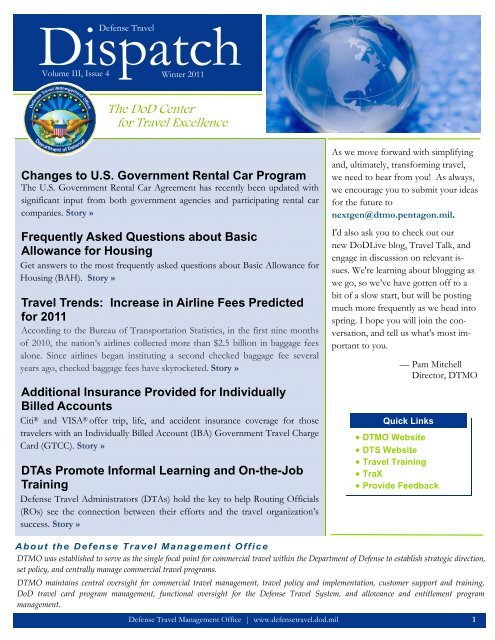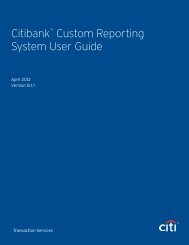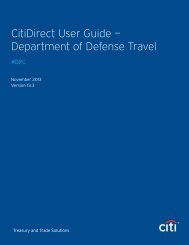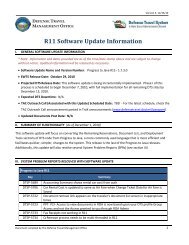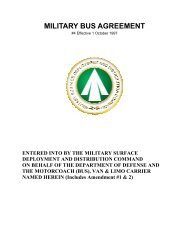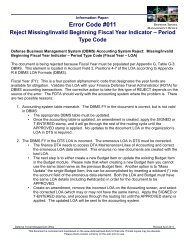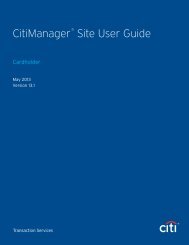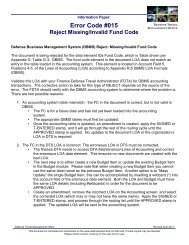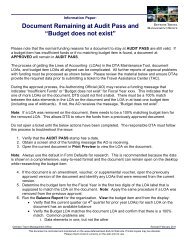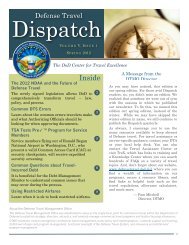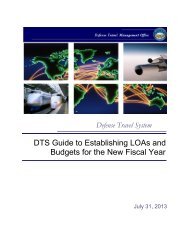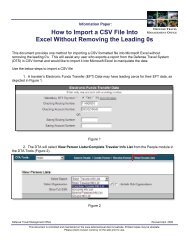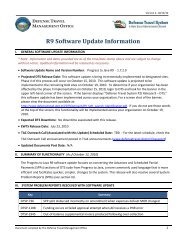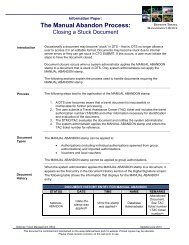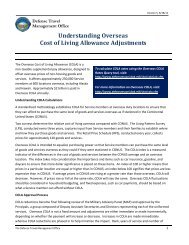Defense Travel Dispatch Winter 2011 - DTMO
Defense Travel Dispatch Winter 2011 - DTMO
Defense Travel Dispatch Winter 2011 - DTMO
You also want an ePaper? Increase the reach of your titles
YUMPU automatically turns print PDFs into web optimized ePapers that Google loves.
<strong>Dispatch</strong><br />
<strong>Defense</strong> <strong>Travel</strong><br />
Volume III, Issue 4<br />
<strong>Winter</strong> <strong>2011</strong><br />
The DoD Center<br />
for <strong>Travel</strong> Excellence<br />
Changes to U.S. Government Rental Car Program<br />
The U.S. Government Rental Car Agreement has recently been updated with<br />
significant input from both government agencies and participating rental car<br />
companies. Story »<br />
Frequently Asked Questions about Basic<br />
Allowance for Housing<br />
Get answers to the most frequently asked questions about Basic Allowance for<br />
Housing (BAH). Story »<br />
<strong>Travel</strong> Trends: Increase in Airline Fees Predicted<br />
for <strong>2011</strong><br />
According to the Bureau of Transportation Statistics, in the first nine months<br />
of 2010, the nation’s airlines collected more than $2.5 billion in baggage fees<br />
alone. Since airlines began instituting a second checked baggage fee several<br />
years ago, checked baggage fees have skyrocketed. Story »<br />
Additional Insurance Provided for Individually<br />
Billed Accounts<br />
Citi ® and VISA ® offer trip, life, and accident insurance coverage for those<br />
travelers with an Individually Billed Account (IBA) Government <strong>Travel</strong> Charge<br />
Card (GTCC). Story »<br />
DTAs Promote Informal Learning and On-the-Job<br />
Training<br />
<strong>Defense</strong> <strong>Travel</strong> Administrators (DTAs) hold the key to help Routing Officials<br />
(ROs) see the connection between their efforts and the travel organization’s<br />
success. Story »<br />
As we move forward with simplifying<br />
and, ultimately, transforming travel,<br />
we need to hear from you! As always,<br />
we encourage you to submit your ideas<br />
for the future to<br />
nextgen@dtmo.pentagon.mil.<br />
I'd also ask you to check out our<br />
new DoDLive blog, <strong>Travel</strong> Talk, and<br />
engage in discussion on relevant issues.<br />
We're learning about blogging as<br />
we go, so we’ve have gotten off to a<br />
bit of a slow start, but will be posting<br />
much more frequently as we head into<br />
spring. I hope you will join the conversation,<br />
and tell us what's most important<br />
to you.<br />
— Pam Mitchell<br />
Director, <strong>DTMO</strong><br />
Quick Links<br />
<strong>DTMO</strong> Website<br />
DTS Website<br />
<strong>Travel</strong> Training<br />
TraX<br />
Provide Feedback<br />
About the <strong>Defense</strong> <strong>Travel</strong> Management Office<br />
<strong>DTMO</strong> was established to serve as the single focal point for commercial travel within the Department of <strong>Defense</strong> to establish strategic direction,<br />
set policy, and centrally manage commercial travel programs.<br />
<strong>DTMO</strong> maintains central oversight for commercial travel management, travel policy and implementation, customer support and training,<br />
DoD travel card program management, functional oversight for the <strong>Defense</strong> <strong>Travel</strong> System, and allowance and entitlement program<br />
management.<br />
<strong>Defense</strong> <strong>Travel</strong> Management Office | www.defensetravel.dod.mil 1
<strong>Defense</strong> <strong>Travel</strong> <strong>Dispatch</strong> Volume III, Issue 4 | <strong>Winter</strong> <strong>2011</strong><br />
Changes to<br />
U.S. Government<br />
Rental Car Program<br />
The U.S. Government Rental Car<br />
Agreement has recently been updated<br />
with significant input from<br />
both government agencies and participating<br />
rental car companies.<br />
<strong>DTMO</strong> manages the U.S. Government<br />
Rental Car Program for the<br />
Federal Government, and administers<br />
the program through an agreement<br />
that outlines the terms and conditions of the program.<br />
U.S. Rental Car Agreement Number 4 governs the rental of<br />
vehicles by military members, employees of the Federal<br />
Government, and employees of the United States Postal<br />
Service when a vehicle is authorized while in official travel<br />
status.<br />
Federal employees can and should secure government rates<br />
under the Agreement by making reservations through their<br />
Commercial <strong>Travel</strong> Office, <strong>Defense</strong> <strong>Travel</strong> System, <strong>Travel</strong><br />
Management Center, E-Gov <strong>Travel</strong> Service, rental car company<br />
website, toll free numbers or walk-up services.<br />
What You Need to Know<br />
The updated Agreement has some key changes and provides<br />
clarification on additional terms and conditions.<br />
Here’s what you need to know:<br />
Government personnel on official travel are responsible<br />
for ensuring the government rate and the Government<br />
Administrative Rate Supplement (GARS) are charged for<br />
all rental car transactions. Both should be charged to the rental.<br />
A mandatory GARS fee of $5.00 per day will be charged<br />
during use of the rental vehicle. The GARS fee is intended<br />
to cover those costs incurred by the rental car<br />
company which are unique to doing business with the<br />
Government.<br />
Official Government <strong>Travel</strong> Charge Cards (GTCC) and/<br />
or travel authorization/orders do not guarantee that government<br />
travelers are covered under the terms and conditions<br />
of the Agreement, unless the government rate is<br />
booked and GARS is charged.<br />
Government rates for hybrid vehicles are available.<br />
Ceiling rates have been established for extra hour and<br />
extra day charges.<br />
Pre-charging for fuel is prohibited.<br />
Damage/accident charges are prohibited from being<br />
placed on a traveler’s Government <strong>Travel</strong> Charge Card.<br />
Collision Damage Waiver/Loss Damage Waiver and Liability<br />
coverage are provided for personal injury, wrongful<br />
death and property damage; however some non-U.S.<br />
locations may require renters to purchase mandatory insurance<br />
due to local laws.<br />
In most cases, when a vehicle is rented under the terms<br />
of the U.S. Government Rental Car Agreement, neither<br />
the Government nor the government renter will be responsible<br />
for loss or damage to a rental vehicle. There<br />
are fourteen exceptions listed on page 9 and 10 of the<br />
Agreement for which the rental car company will not be<br />
responsible for such costs.<br />
To review the Rental Car Agreement, visit: http://<br />
www.defensetravel.dod.mil/Docs/<br />
CarRentalAgreement.pdf.<br />
NEW REQUIREMENT<br />
FOR BENEFITS<br />
INCLUDES<br />
LIABILITY COVERAGE<br />
PROHIBITS<br />
PRE-CHARGING FUEL<br />
GOVERNMENT RATES<br />
FOR HYBRIDS<br />
Government Rate<br />
+ GARS<br />
= Benefits<br />
<strong>Defense</strong> <strong>Travel</strong> Management Office | www.defensetravel.dod.mil 2
<strong>Defense</strong> <strong>Travel</strong> <strong>Dispatch</strong> Volume III, Issue 4 | <strong>Winter</strong> <strong>2011</strong><br />
Frequently Asked<br />
Questions about<br />
Basic Allowance for<br />
Housing<br />
Basic Allowance for Housing (BAH) provides Uniformed<br />
Service members equitable housing compensation<br />
based on housing costs in local civilian housing<br />
markets within the Continental United States<br />
(CONUS) when government quarters are not provided.<br />
<br />
<br />
<br />
<br />
Who is eligible for BAH? Service members assigned<br />
to permanent duty stations are eligible for BAH when<br />
government quarters are not available. This allowance<br />
assists Service members with acquiring housing comparable<br />
to civilians who are in the same income range.<br />
Will BAH cover all my housing expenses? BAH is<br />
NOT designed to cover all housing costs for all members.<br />
Some members at a location may have out-ofpocket<br />
expenses. This is because BAH rates are based<br />
on the median costs of rent. The cost of utilities and<br />
renter’s insurance is also considered. A Service member’s<br />
actual expenses may be higher or lower based on<br />
Service members’ actual choice of housing and where<br />
they live. Only a member whose housing costs are exactly<br />
at or below the median will have no out-of-pocket<br />
expenses.<br />
What is BAH rate protection? If a member’s BAH<br />
rate is less than the previous year, BAH rate protection<br />
assures that the member receives at least the same<br />
amount of BAH as the previous year, provided that the<br />
member’s duty location, rank and dependency status<br />
stays the same. If a Service member’s BAH increases<br />
from one year to the next, the member will receive the<br />
higher BAH rate as long as his eligibility is uninterrupted.<br />
Does rate protection keep me from getting rate increases?<br />
No. An individual is authorized the larger of:<br />
(a) the January 1 published BAH for grade, location and<br />
<br />
<br />
dependency status; or (b) the housing allowance being<br />
paid on December 31.<br />
Why does the BAH for my grade not cover my<br />
mortgage payment? BAH rates are based on the local<br />
rental market data. BAH is based only on rental<br />
properties, not homeownership costs like mortgage<br />
payments and property taxes. Members are still free to<br />
make housing choices that best suit their needs.<br />
Why is BAH based on duty location? Why not use<br />
my residence location? The policy decision to use<br />
duty location as a basis for BAH is based on the desire<br />
to compensate members for the typical housing cost<br />
near the member's duty location. Once the duty station<br />
is known, the BAH compensation is fixed, regardless<br />
of where the member lives. The goal is that members<br />
receive BAH that is sufficient to live a reasonable distance<br />
(generally, about an hour) from a duty station.<br />
Members have the freedom to choose a neighborhood<br />
that suits their individual needs; for example, a member<br />
may choose to rent more expensive housing close<br />
to his duty station or trade-off a longer commute to<br />
work for either a larger or less expensive house in an<br />
outlying area.<br />
Visit the <strong>DTMO</strong> website, http://<br />
www.defensetravel.dod.mil/site/bah.cfm, for more information<br />
about BAH. It includes additional FAQs, a BAH<br />
calculator, a short video and other communication products<br />
that are designed to increase awareness and understanding<br />
of the allowance.<br />
<strong>Defense</strong> <strong>Travel</strong> Management Office | www.defensetravel.dod.mil 3
<strong>Defense</strong> <strong>Travel</strong> <strong>Dispatch</strong> Volume III, Issue 4 | <strong>Winter</strong> <strong>2011</strong><br />
Reprinted with permission from the<br />
National Counter Intelligence Executive<br />
YOU SHOULD KNOW<br />
In most countries you have no expectation<br />
of privacy in Internet cafes,<br />
hotels, offices, or public places. Hotel<br />
business centers and phone networks<br />
are regularly monitored. In<br />
some countries, hotel rooms are often<br />
searched.<br />
All information you send electronically<br />
– by fax machine, personal digital<br />
assistant (PDA), computer, or<br />
telephone – can be intercepted.<br />
Wireless devices are especially vulnerable.<br />
Security services and criminals can<br />
track your movements using your<br />
mobile phone or PDA and can turn<br />
on the microphone in your device<br />
even when you think it’s off. To prevent<br />
this, remove the battery.<br />
Security services and criminals can<br />
also insert malicious software into<br />
your device through any connection<br />
they control. They can also do it<br />
wirelessly. When you connect to<br />
your home server, the “malware” can<br />
migrate to your agency, or home system,<br />
can inventory your system, and<br />
can send information back to the<br />
security service or potential malicious<br />
actor.<br />
Transmitting sensitive government,<br />
personal, or proprietary information<br />
from abroad is therefore risky.<br />
Government officials are most at<br />
risk, but don’t assume you’re too insignificant<br />
to be targeted.<br />
If a customs official demands to examine<br />
your device, or if your hotel<br />
room is searched while the device is<br />
in the room and you’re not, you<br />
should assume the device’s hard<br />
drive has been copied.<br />
BEFORE YOU TRAVEL<br />
If you can do without the device,<br />
don’t take it.<br />
Don’t take information you don’t<br />
need. Back up all information you<br />
take; leave the backed-up data at<br />
home.<br />
If feasible, use a different mobile<br />
phone or PDA from your usual one<br />
and remove the battery when not in<br />
use. In any case, have the device examined<br />
by your agency or company<br />
when you return.<br />
Create a strong password (numbers,<br />
upper and lower case letters, special<br />
characters – at least 8 characters<br />
long). Never store passwords, phone<br />
numbers, or sign-on sequences on<br />
any device or in its case.<br />
Change passwords at regular intervals<br />
(and as soon as you return).<br />
Encrypt all sensitive information on<br />
the device. (But be warned: In some<br />
countries, customs officials may not<br />
permit you to enter with encrypted<br />
information.)<br />
Update your web browser with strict<br />
security settings.<br />
Disable infrared ports and features<br />
you don’t need.<br />
WHILE YOU’RE AWAY<br />
Avoid transporting devices in<br />
checked baggage.<br />
Use digital signature and encryption<br />
capabilities when possible.<br />
Don’t leave electronic devices unattended.<br />
If you have to stow them,<br />
remove the battery and SIM card and<br />
keep them with you.<br />
Shield passwords from view. Don’t<br />
use the “remember me” feature; retype<br />
the password every time. Be<br />
aware of who’s looking at your<br />
screen, especially in public areas.<br />
Terminate connections when you’re<br />
not using them.<br />
Clear your browser after each use:<br />
delete history files, caches, cookies,<br />
URL, and temporary internet files.<br />
Don’t open emails or attachments<br />
from unknown sources. Don’t click<br />
on links in emails.<br />
Empty your “trash” and “recent”<br />
folders after every use.<br />
Avoid Wi-Fi networks if you can. In<br />
some countries they’re controlled by<br />
security services; in all cases they’re<br />
insecure.<br />
If your device or information is stolen,<br />
report it immediately to your<br />
home organization and the local US<br />
embassy or consulate.<br />
WHEN YOU RETURN<br />
Change your password.<br />
Have your agency examine the device<br />
for the presence of malicious<br />
software.<br />
<strong>Defense</strong> <strong>Travel</strong> Management Office | www.defensetravel.dod.mil 4
<strong>Defense</strong> <strong>Travel</strong> <strong>Dispatch</strong> Volume III, Issue 4 | <strong>Winter</strong> <strong>2011</strong><br />
Ask<br />
<strong>DTMO</strong><br />
Q:<br />
Why can’t government contractors<br />
use DTS to arrange travel?<br />
A: There are several contractual, legal, and financial reasons<br />
that preclude government contract personnel from<br />
using DTS to arrange travel or for submitting travel<br />
claims for reimbursement. Some of the reasons are outlined<br />
below.<br />
DTS directly reimburses a traveler for travel-related<br />
expenses. Providing payment directly to a contractor’s<br />
employees versus the contractor would be in violation<br />
of the Anti-Assignment Act, 41 U.S.C. 15. This law<br />
prohibits transfer of Government contracts from the<br />
contractor to a third party. In this case, direct payment<br />
to a contract employee would constitute transferring a<br />
contract to a third party. Although Federal Acquisition<br />
Regulation (FAR) 42.1204 outlines certain circumstances<br />
in which the Government can pay a contractor's<br />
claim to a third party, none of those circumstances<br />
permit paying a travel claim to a contractor employee.<br />
Direct payment to contract personnel would also put<br />
the Government at risk for financial loss because the<br />
government may be unable to recoup incorrect payments.<br />
The DoD Financial Management Regulation,<br />
Volume 10, Chapter 18, deals with debt collection<br />
against a contractor but not a contractor's employees.<br />
DTS enforces travel regulations as stated in the Joint<br />
<strong>Travel</strong> Regulations (JTR) and Joint Federal <strong>Travel</strong><br />
Regulations (JFTR), which only apply to federal employees<br />
and uniformed personnel. Neither regulation<br />
has the authority to enforce travel regulations for contractors<br />
or their employees.<br />
DTS is not designed to support travel by contract employees<br />
because the system provides access to GSA<br />
City Pair fares and other government contracted transportation<br />
fares. The Joint Federal <strong>Travel</strong> Regulations<br />
(JFTR) and the Joint <strong>Travel</strong> Regulations (JTR) permit<br />
only federal employees and uniformed personnel to<br />
use these fares. Contactors and contract employees are<br />
not eligible for these program benefits and rates.<br />
To arrange travel, DTS requires the use of either a<br />
Government <strong>Travel</strong> Charge Card or a Centrally Billed<br />
Account, neither of which a contract employee is authorized<br />
to use.<br />
For all of these reasons, DTS does not support travel by<br />
contractor employees.<br />
Q:<br />
Can I be reimbursed for tips while<br />
I’m on official travel?<br />
A: <strong>Travel</strong>ers may be reimbursed for tips either through<br />
the incidental expenses portion of the Meals and Incidental<br />
Expenses (M&IE) per diem rate or as a reimbursable<br />
expense.<br />
Tips included as incidental expenses include: fees and<br />
tips to porters, baggage carriers, bellhops, hotel maids,<br />
stewards or stewardesses and others on ships, and hotel<br />
servants in foreign countries. See JFTR/JTR, APP A,<br />
Part I under per diem for definition. For an employee<br />
with a disability or special need, see par. C7460-item 4,<br />
regarding baggage-handling costs incurred as a direct result<br />
of an employee's disability.<br />
Tips listed as reimbursable expenses include (See JFTR/<br />
JTR, APP G):<br />
<br />
<br />
Tips aboard commercial ships (Uniformed Members<br />
Only): Tips to stewards and other attendants<br />
paid by or on behalf of dependents aboard commercial<br />
ships.<br />
Tips for handling government property: Transportation-related<br />
tips for handling government property<br />
at terminals and lodgings are authorized.<br />
Tips, Transportation-Related: Transportationrelated<br />
tips for the drivers of taxis, limousines, and<br />
courtesy transportation are authorized.<br />
<strong>Defense</strong> <strong>Travel</strong> Management Office | www.defensetravel.dod.mil 5
<strong>Defense</strong> <strong>Travel</strong> <strong>Dispatch</strong> Volume III, Issue 4 | <strong>Winter</strong> <strong>2011</strong><br />
New Functionality with<br />
Cross-Organization Funding<br />
Recent changes to DTS have enhanced<br />
the Cross-Organization (X-Org) Funding<br />
functionality. The feature, which allows<br />
organizations to share a line of accounting<br />
(LOA), now permits a LOA to be<br />
shared with a specific traveler.<br />
At any time, the funding organization<br />
may remove the LOA label from use by<br />
an organization or traveler. The LOA<br />
label and the budget will remain the responsibility<br />
of the organization controlling<br />
the funds. The organization can run<br />
reports to determine whether the LOA<br />
label was used.<br />
Tips for DTAs<br />
With the reissuance of expiring government<br />
travel charge cards (GTCC) in full<br />
swing and the conversion of many organizations<br />
from NSPS to the General<br />
Schedule, it is important that the traveler<br />
profiles in DTS be reviewed. Using the<br />
"View Person List" in the DTS Maintenance<br />
Module People option, DTAs can<br />
run a report to quickly review various<br />
data elements of travelers' profiles.<br />
Among the most important data elements<br />
that must be accurate are travelers'<br />
organizational addresses and phone<br />
numbers, email addresses, charge card<br />
numbers with expiration dates, permission<br />
levels, and grade. The output of the<br />
report is in Excel, so it is easy to sort by<br />
any of the data elements such as suborganization.<br />
You can also provide extracts<br />
of the report to your agency program<br />
coordinators (APCs), as well as<br />
Additionally, the function has been enhanced<br />
to allow the funding organization's<br />
FDTA to designate a specific<br />
routing list to be used for a crossorganization<br />
LOA. If a routing list is<br />
designated for a cross-organization<br />
LOA, the specified routing list will appear<br />
as the traveler's default routing list<br />
on the affected document's Digital Signature<br />
screen. The traveler cannot select<br />
another routing list for the document<br />
and if a specific routing list is not designated,<br />
then the default routing list from<br />
the traveler's permanent profile will display<br />
on the Digital Signature screen.<br />
For further information about X-Org<br />
funding, please see Chapter 8 of the<br />
DTA Manual.<br />
personnel officers<br />
to verify home<br />
addresses and<br />
grade information.<br />
Your organizational<br />
personnel<br />
responsible for Internal Controls can<br />
review the permission levels to ensure<br />
adequate separation of duties. <strong>Travel</strong>ers<br />
can review and make necessary updates<br />
by logging into DTS and, from the top<br />
of their welcome screen, selecting <strong>Travel</strong>er<br />
Setup>Update Personal Profile.<br />
Using the links at the top of the page,<br />
they can navigate to the different parts<br />
of their profile. If there are fields travelers<br />
cannot update, they can provide the<br />
Organizational DTA with the necessary<br />
information. The DTA can make necessary<br />
updates using the DTS Maintenance<br />
Module.<br />
DTS Update<br />
In December, the process of<br />
converting sections of DTS<br />
code from Progress to Java, a<br />
more commonly used language,<br />
was completed. Over<br />
the next few months, software<br />
updates that focus on correcting<br />
system problems causing<br />
users the most difficulty will be<br />
implemented.<br />
The next software update is<br />
currently scheduled for March<br />
<strong>2011</strong>. In addition to resolving<br />
several system issues, this update<br />
will include functionality<br />
that allows a traveler’s social<br />
security number (SSN) to be<br />
masked when printing a DTS<br />
travel document.<br />
For more information on this<br />
software update including associated<br />
system downtime,<br />
continue to monitor the DTS<br />
homepage,<br />
TraX or the<br />
<strong>DTMO</strong> website.<br />
<strong>Defense</strong> <strong>Travel</strong> Management Office | www.defensetravel.dod.mil 6
<strong>Defense</strong> <strong>Travel</strong> <strong>Dispatch</strong> Volume III, Issue 4 | <strong>Winter</strong> <strong>2011</strong><br />
<strong>Travel</strong> Trends:<br />
Increase in Airline Fees<br />
Predicted for <strong>2011</strong><br />
According to the Bureau of Transportation Statistics, in<br />
the first nine months of 2010, the nation’s airlines collected<br />
more than $2.5 billion from baggage fees. Since airlines<br />
began instituting checked baggage fees several years ago,<br />
the variety and amount of fees have skyrocketed.<br />
In addition to the baggage fees that many airlines already<br />
charge, travelers are likely to see more fees associated with<br />
air travel. Some airlines already charge for seats they believe<br />
to be premium. Other airline charges travelers may<br />
see in <strong>2011</strong> include: fees associated with carry-on bags, an<br />
in-person check-in fee (which is a fee to check in with an<br />
airline employee instead on checking in online or at a kiosk<br />
at the airport), fees for reservation changes, snacks and<br />
drinks, as well as pillows and blankets.<br />
Depending on the airline carrier policy, government and<br />
military travelers may be exempt from these fees. It is,<br />
however, important to note that a waiver of baggage fee<br />
charges for military members in uniform may not be extended<br />
by U.S. carrier code share flights, as the baggage<br />
rules of the code share carrier will apply. Military members<br />
should be prepared to pay baggage fees, if and when applicable,<br />
on these code share flights. In these instances, baggage<br />
fees are reimbursable, provided that the Authorizing<br />
Official approves the expense. If the number of bags exceed<br />
the baggage<br />
allowance set by<br />
the airline, then<br />
the additional fees<br />
incurred must be<br />
approved by the<br />
Authorizing Official<br />
to be reimbursable<br />
to the<br />
traveler.<br />
A number of airlines also charge for seats they consider<br />
premium, such as an aisle seat, a larger seat or a seat in<br />
front of the cabin. The choice to pay extra for "premium"<br />
seats is personal to the employee and is not a requirement<br />
of the government. Accordingly, this is an expense that<br />
must be incurred by the employee and may not be<br />
reimbursable.<br />
For an up-to-date list of airline checked baggage fees specific<br />
to carriers under the City Pair Program, visit the Baggage<br />
Allowance and Seat Choice Fact Sheets on the GSA<br />
website, www.gsa.gov (City Pair Program/Fact Sheets) or<br />
visit the carrier’s website.<br />
Connect with <strong>DTMO</strong> through<br />
<strong>Travel</strong> Talk<br />
Ever wonder what’s on the mind<br />
of <strong>DTMO</strong>’s Director? Check out<br />
our new DoDLive blog—<strong>Travel</strong><br />
Talk with DoD. <strong>Travel</strong> Talk is<br />
designed to share travel news<br />
and initiate an ongoing conversation<br />
with you, our most important<br />
stakeholder.<br />
To access, visit the <strong>DTMO</strong> website<br />
and click on “Talk Back—<br />
Click to Participate” link in the<br />
Director’s blog section.<br />
<strong>Defense</strong> <strong>Travel</strong> Management Office | www.defensetravel.dod.mil 7
<strong>Defense</strong> <strong>Travel</strong> <strong>Dispatch</strong> Volume III, Issue 4 | <strong>Winter</strong> <strong>2011</strong><br />
DTAs Promote Informal Learning<br />
and On-the-Job Training<br />
<strong>Defense</strong> <strong>Travel</strong> Administrators<br />
(DTAs), hold the key to help Routing<br />
Officials (ROs) see the connection<br />
between their efforts and the success<br />
of your organization’s travel program.<br />
As a DTA, you understand that accurate<br />
and timely DTS document approval<br />
is vital to that success and to<br />
achieve that, ROs must perform their<br />
tasks quickly, correctly, and completely.<br />
DTAs have access to a set<br />
of learning resources that can be<br />
used to better educate ROs on the<br />
tasks they perform.<br />
Whether educating a new member<br />
of your travel program, or helping a<br />
current one fill in a few gaps in understanding<br />
DTS, the DTA Approval<br />
Process training materials can be used<br />
as designed, or customized to meet<br />
your needs and time frame.<br />
Perform a Quick Needs<br />
Analysis<br />
Consider the RO’s responsibilities<br />
and your travel organization’s need<br />
for improved efficiency with respect<br />
to the following:<br />
Do the members of your travel<br />
management team require comprehensive,<br />
end-to-end instruction?<br />
Are your team members knowledgeable<br />
about most of the route<br />
and review process, but need a refresher<br />
or reinforcement on a few<br />
topics?<br />
What is this gap in knowledge costing<br />
your organization in terms of<br />
time?<br />
Access the Training Materials<br />
and Take a Look<br />
DTA Approval Process training materials<br />
can be accessed through <strong>Travel</strong> Explorer<br />
or the new Training Resources<br />
Lookup tool on the <strong>DTMO</strong> website<br />
(choose Instructor Resources from the<br />
“type” drop down).<br />
You will find an instructor guide, a<br />
participant guide, and PowerPoint<br />
slides that can be used as-is or customized<br />
to suit your needs. The instructor<br />
guide includes the following:<br />
Lesson plans that outline how to<br />
teach each topic<br />
Guidance on preparing participants<br />
for learning<br />
Instructions for using the accompanying<br />
PowerPoint slides and<br />
the participant guide<br />
Practice exercises and assessments<br />
on each topic<br />
The materials enable you to educate<br />
your team on selected topics via inclassroom<br />
training or web-conference,<br />
in which learners participate at their<br />
own desks. Most topics can be covered<br />
within 10 to 30 minutes each. Topics<br />
include:<br />
Route and Review Process<br />
<strong>Travel</strong>er Setup<br />
Document Reviews/Adjustments<br />
Route/Sign<br />
DTS Approval Process Summary<br />
Engage Your Team<br />
Take a few minutes to see how you can<br />
build a more efficient travel organization<br />
by helping your team members<br />
improve their individual performance.<br />
You can select the topics based on the<br />
amount of time you have for training,<br />
or complete them all within a few<br />
weeks via a weekly lunch and learn. An<br />
assessment is available at the end of<br />
the course. Upon completion, students<br />
will receive a class completion certificate.<br />
<strong>Defense</strong> <strong>Travel</strong> Management Office | www.defensetravel.dod.mil 8
<strong>Defense</strong> <strong>Travel</strong> <strong>Dispatch</strong> Volume III, Issue 4| <strong>Winter</strong> <strong>2011</strong><br />
Additional Rental Cars<br />
Insurance Go Smoke-Free<br />
Provided for IBAs To meet the demands of the general public,<br />
Did you know that Citi ® and VISA ® offer trip, life, and accident insurance<br />
coverage for those travelers with an Individually Billed Account<br />
(IBA) Government <strong>Travel</strong> Charge Card (GTCC)*?<br />
Citi provides trip and life insurance that covers both lost luggage and<br />
travel accident situations. Additional information on the trip and life<br />
insurance may be found in your cardholder agreement posted at<br />
http://www.transactionservices.citigroup.com/transactionservices/<br />
home/card_solutions/commercial_cards/<br />
fed_govt_svcs/forms.jsp.<br />
<strong>Travel</strong> Accident Insurance<br />
As cardholders, DoD travelers are insured against a<br />
plethora of misfortunate accidents. Accidental loss of<br />
life, limb, sight, speech or hearing while riding as a passenger in, entering<br />
or exiting any licensed common carrier are covered, provided the<br />
entire cost of the passenger fare(s), less redeemable certificates, vouchers<br />
or coupons, has been charged to your Citi/DoD <strong>Travel</strong> Card. For<br />
more information regarding this policy or to file a claim, call toll-free<br />
at 1-800-418-1515.<br />
Lost Luggage Insurance<br />
Cardholders receive coverage for permanently lost,<br />
stolen or damaged articles when the carrier fare is<br />
charged to your GTCC. This coverage is secondary<br />
to the Common Carrier’s liability and only for the<br />
amount not covered under the carrier’s coverage. For<br />
general information regarding individually billed accounts, call toll-free<br />
1-800-586-8458. If calling from outside the U.S., call collect at 804-673<br />
-1673.<br />
Auto Collision Damage<br />
In addition, separate coverage is provided by VISA<br />
for auto rental collision damage in certain situations.<br />
You may find complete information on auto insurance,<br />
to include how to file a claim with VISA, at<br />
http:usa.visa.com/corporate/mid_size/payment/bft_auto_rental.html<br />
or to speak with a Benefit Administrator at 1-800-VISA-911.<br />
*Coverage/insurance does NOT apply for purchases made on an organization’s<br />
Centrally Billed Account (CBA).<br />
rental car companies have recently changed<br />
their policies regarding smoking in rental vehicles.<br />
Companies such as, Ace, Advantage,<br />
Alamo, Avis, Budget, Dollar, Enterprise, Europcar,<br />
Hertz, National, Nissan, Payless and<br />
Thrifty have instituted new policies that may<br />
cost you if you decide to smoke in a rental<br />
vehicle.<br />
Companies have started issuing fines for violating<br />
the no smoking policies. Moreover,<br />
these penalties are not reimbursable costs by<br />
the Government, which means that travelers<br />
will have to pay fines out-of-pocket.<br />
Smoke free policies vary from discouraging<br />
smoking in vehicles, to an all out restriction<br />
with penalties. Avis, Budget, Dollar, and<br />
Thrifty rental car companies have imposed an<br />
automatic $250 penalty when they detect<br />
smoking in a designated smoke-free rental<br />
vehicle. Alamo, Enterprise and National will<br />
impose a penalty that is determined by how<br />
much it will cost them to detail the vehicle,<br />
along with administrative and “loss of use”<br />
costs. Some of Payless’ locations impose a<br />
penalty for smoking, but<br />
not all do. Ace, Advantage,<br />
Europcar, Hertz,<br />
and Nissan offer smokefree<br />
rental vehicles; but,<br />
at this time, do not have<br />
penalties for smoking in<br />
their vehicles. You<br />
should check with your<br />
rental car company regarding<br />
their smoke free<br />
policy prior to renting a<br />
vehicle.<br />
<strong>Defense</strong> <strong>Travel</strong> Management Office | www.defensetravel.dod.mil 9
<strong>Defense</strong> <strong>Travel</strong> <strong>Dispatch</strong> Volume III, Issue 4| <strong>Winter</strong> <strong>2011</strong><br />
Change in Overseas COLA<br />
for Service Members<br />
in Alaska<br />
As a result of recent increases in the prices of goods and<br />
services in comparison to average prices in the U.S., nearly<br />
23,000 Service members stationed at 10 locations in Alaska<br />
saw an increase in their Overseas Cost of Living Allowance<br />
(COLA) in February. Service members in Kodiak and<br />
Nome saw the greatest increase at four-points, while other<br />
locations such as Anchorage and Juneau recieved a twopoint<br />
increase. Personnel in a few locations did not see an<br />
increase in their COLA, as their costs grew at about the<br />
same rate as Continental United States (CONUS).<br />
Overseas COLA is intended to equalize purchasing power<br />
so that Service members can purchase the same level of<br />
goods and services overseas as they could if they were at<br />
duty stations in the CONUS. Overseas COLA is not a<br />
fixed amount. Data driven adjustments are either immediate<br />
or made incrementally. Increases in COLA are made<br />
immediately, whereas reductions are phased in over time to<br />
help minimize the impact of the adjustment.<br />
Service members can calculate<br />
their COLA rate at http://<br />
www.defensetravel.dod.mil/<br />
site/colaCalc.cfm.<br />
The calculation tool is updated<br />
with the current COLA<br />
amounts each pay-period. Learn<br />
more about COLA, and other allowances at http://<br />
www.defensetravel.dod.mil/site/allowances.cfm.<br />
"I'm surprised<br />
how well it works from<br />
Europe!"<br />
— Participant in Germany<br />
“Thank you for<br />
providing clear, concise<br />
training. I have obtained a lot<br />
of vital information that will<br />
benefit my role as an<br />
Authorizing Official.”<br />
— Recent participant<br />
"I appreciated<br />
the notes that came<br />
along with the<br />
slides, very useful."<br />
— Recent participant<br />
See what everyone is<br />
talking about . . .<br />
Are you interested in online travel training? Why not try<br />
<strong>DTMO</strong>’s Distance Learning courses. Distance Learning<br />
offers a variety of topics that are delivered through an<br />
interactive combination of PowerPoint presentations<br />
and live demonstrations with a live instructor via <strong>Defense</strong><br />
Connect Online.<br />
Participants from around the globe agree that <strong>DTMO</strong>’s<br />
free Distance Learning courses offer an excellent learning<br />
experience. Come see what everyone is talking<br />
about!<br />
For Distance Learning course descriptions and the current<br />
schedule, visit http://www.defensetravel.dod.mil/<br />
site/eLearning.cfm.<br />
<strong>Defense</strong> <strong>Travel</strong> Management Office | www.defensetravel.dod.mil 10
<strong>Defense</strong> <strong>Travel</strong> <strong>Dispatch</strong> Volume III, Issue 4 | <strong>Winter</strong> <strong>2011</strong><br />
New Mileage Rates<br />
in Effect<br />
Hurry, Seats are<br />
Filling Fast!<br />
CY <strong>2011</strong> POV Mileage Rates<br />
The General Services Administration (GSA) released the<br />
CY <strong>2011</strong> privately owned vehicle (POV) mileage reimbursable<br />
rates that are in effect for travel after January 1,<br />
<strong>2011</strong>. Pursuant to the Federal <strong>Travel</strong> Regulation (FTR)<br />
§301-10.303, the <strong>2011</strong> rates are:<br />
Privately owned automobile: $0.51<br />
Privately owned motorcycle: $0.48<br />
Privately owned airplane: $1.29<br />
Privately owned automobile when a government<br />
owned automobile is authorized: $0.19*<br />
Any travel voucher created in 2010 for travel after January<br />
1, <strong>2011</strong>, will need to be updated. To update, login to DTS<br />
and navigate to the mileage portion of the voucher. Remove<br />
the current mileage listed, and re-enter it. DTS will<br />
automatically load the new rate and recalculate appropriately.<br />
If you have any questions, contact your <strong>Defense</strong> <strong>Travel</strong><br />
Administrator (DTA) or the <strong>Travel</strong> Assistance Center<br />
(TAC). The TAC can be reached by submitting a help<br />
ticket online through TraX or by calling 1-888-Help1Go.<br />
If calling from overseas, use a DSN to dial directly.<br />
*This reimbursable rate is to be used for travelers who are authorized<br />
to use a government owned automobile (GOA) for<br />
temporary duty travel and choose to use a privately owned<br />
automobile (POA) instead.<br />
PCS MALT Mileage Rate<br />
In January <strong>2011</strong>, the Permanent Change in Duty Station/<br />
Military Allowance in Lieu of Transportation (PCS/<br />
MALT) rate increased from 16.5 to 19 cents per mile.<br />
TDY and local rates changed from 50 to 51 cents for a<br />
car, 47 to 48 cents for a motorcycle and from 28.5 or 12.5<br />
to a single rate of 19 cents per mile when a privately<br />
owned vehicle is used instead of a government vehicle.<br />
Alexandria, VA<br />
April 19‐21<br />
<strong>Travel</strong> managers and administrators from around the<br />
globe are invited to participate in this event. The <strong>2011</strong><br />
Seminar is intended to develop functional knowledge, as<br />
well as create awareness of emerging industry trends, and<br />
educate DoD’s travel community on the ever changing<br />
<strong>Defense</strong> travel environment.<br />
At this year’s seminar, spend quality time networking<br />
with other administrators, and participate in several forums<br />
that encourage conversations and seek feedback on<br />
the <strong>Defense</strong> <strong>Travel</strong> Enterprise.<br />
For more information, visit<br />
www.defensetravel.dod.mil<br />
<strong>Defense</strong> <strong>Travel</strong> <strong>Dispatch</strong><br />
The <strong>Defense</strong> <strong>Travel</strong> <strong>Dispatch</strong> is a quarterly<br />
publication issued by the <strong>Defense</strong> <strong>Travel</strong> Management Office,<br />
Office of the Under Secretary of <strong>Defense</strong><br />
(Personnel & Readiness).<br />
The reproduction of the <strong>Dispatch</strong> is permissible for<br />
official use only.<br />
To subscribe to the <strong>Dispatch</strong>, visit<br />
www.defensetravel.dod.mil<br />
For previous editions of the <strong>Dispatch</strong>, visit<br />
http://www.defensetravel.dod.mil/s/dispatch<br />
Volume III, Issue 4 — <strong>Winter</strong> <strong>2011</strong><br />
<strong>Defense</strong> <strong>Travel</strong> Management Office | www.defensetravel.dod.mil 11


